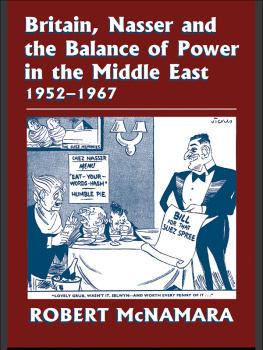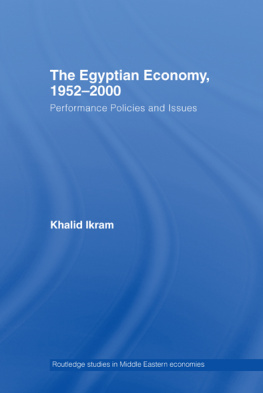BRITAIN, NASSER AND THE BALANCE OF POWER IN THE MIDDLE EAST 19521967
CASS SERIES: BRITISH FOREIGN AND COLONIAL POLICY
ISSN: 14675013
Series Editor: Peter Catterall
This series provides insights into both the background influences on and the course of policy-making towards Britains extensive overseas interests during the past 200 years.
Whitehall and the Suez Crisis, Saul Kelly and Anthony Gorst (eds)
Liberals, International Relations and Appeasement: The Liberal Party, 19191939, Richard S.Grayson
British Government Policy and Decolonisation, 19451963: Scrutinising the OfficialMind, Frank Heinlein
Harold Wilson and European Integration: Britains Second Application to Join the EEC, Oliver Daddow (ed.)
Britain, Israel and the United States, 19551958: Beyond Suez, Orna Almog
The British Political Elite and the Soviet Union, 19371939, Louise Grace Shaw
Britain, Nasser and the Balance of Power in the Middle East, 19521967: From theEgyptian Revolution to the Six Day War, Robert McNamara
BRITAIN, NASSER and the BALANCE OF POWER in the MIDDLE EAST 19521967
From the Egyptian Revolution to the Six Day War
ROBERT McNAMARA
National University of Ireland, Maynooth
First published in 2003 in Great Britain by
FRANK CASS PUBLISHERS
Crown House, 47 Chase Side
London N14 5BP
This edition published in the Taylor & Francis e-Library, 2005.
To purchase your own copy of this or any of Taylor & Francis or Routledges collection of thousands of eBooks please go to www.eBookstore.tandf.co.uk.
and in the United States of America by
FRANK CASS PUBLISHERS
c/o ISBS, 920 NE 58th Avenue, # 300
Portland, Oregon, 972133786
Website: www.frankcass.com
Copyright 2003 R.McNamara
British Library Cataloguing in Publication Data
McNamara, Robert
Britain, Nasser and the balance of power in the Middle East, 19521967: from the Egyptian revolution to the Six-Day War.(Cass series. British foreign and colonial policy)
1. Great BritainForeign relationsMiddle East 2. Middle EastForeign relationsGreat Britain 3. Great BritainForeign relations19451964. 4. EgyptForeign relations19521970
I. Title
327.4105609045
ISBN 0-203-49530-6 Master e-book ISBN
ISBN 0-203-58192-X (Adobe eReader Format)
ISBN 0-7146-5397-7 (Print Edition) (cloth)
ISSN 1467-5013
Library of Congress Cataloging-in-Publication Data
McNamara, Robert, 1974
Britain, Nasser and the balance of power in the Middle East, 19521967: from the Egyptian revolution to the Six-Day War/Robert McNamara.
p. cm.(Cass series-British foreign and colonial policy, ISSN 14675013) Includes bibliographical references (p.) and index.
ISBN 0-7146-5397-7 (Print Edition) (cloth)
1. Egypt-Politics and government-19521970. 2. Nasser, Gamal Abdul, 19181970. 3. Great Britain-Foreign relations-Egypt. 4. Egypt-Foreign relations-Great Britain. 5. Great Britain-Foreign relations-19451964. 6. Arab nationalism. 7. Panarabism.
I. Title. II. Series.
DT107.827.M394 2003
327.4106209045dc21
2002041579
All rights reserved. No part of this publication may be reproduced, stored in or introduced into aretrieval system or transmitted in any form or by any means, electronic, mechanical, photocopying,recording or otherwise, without the prior written permission of the publisher of this book.
Series Editors Preface
ON 24 JULY 1952 Harold Macmillan noted in his diary In Egypt, a military coup detat (which may prove healthy) has intimidated the King, the corrupt old politicians, and the corrupt old generals. It remains to be seen how soon the Young Egyptian movement will itself be corrupted. It is easy to forget, in the light of subsequent events, that the coup, shortly followed by King Farouks abdication, was not seen necessarily as a bad thing from the British point of view. Egypt may have been central to British policy in the Middle Eaststraddling as it did the strategically important Suez Canal, the bases protecting which housed some 70,000 British troopsbut the relationship with the old regime had been fraught with difficulties. There were disputes over finance, over the Egyptian claim to the Sudan and, not least, the looming requirement to renegotiate the terms on which the British remained in the Suez bases. On his accession to power Nasser and his colleagues thus already found a very full agenda of Anglo-Egyptian problems.
Nasser did, however, bring a rather different ideological approach to that of the old political classessuch as the nationalist Wafdhe despised and suppressed. As Robert McNamara argues here, he sought not just nationalist goals such as the removal of the British from Egypt, but pan-Arabist ones which brought him into conflict with other Arab leadersand through them the Britishthroughout the Middle East. In this there was a consistency of aim if not of allies. The Saudis, for instance, had no particular reasons to look with favour on the British and were more well-disposed towards Egypt in the 1950s. In the early 1960s, in contrast, Nassers support for the revolution in Yemen was to help pave the way for a rapprochement between the British and the Saudis which, for the former, bore fruit, amongst other things, in the first of a long and continuing series of defence contracts.
Thus the Anglo-Egyptian problems Nasser inherited were replaced by new ones. By July 1954 the Bases Agreement was largely resolved, and with it the related financial disputes, aided by the fact that the British regarded the garrisons as having been rendered essentially redundant in the new situation of nuclear weapons. The British meanwhile also found his replacements rather more amenable on the Sudan than Farouk had been. Thereafter, however, as McNamara shows, the disputes between the two countries instead extended to the whole Middle East, exacerbated to some extent by the anxieties that Nasser was some kind of Egyptian Mussolini formed by some British statesmen. This account is therefore of importance for much more than the study of Anglo-Egyptian relations. And in explaining these wider Middle Eastern conflicts McNamara has also had skilfully to untwine the interlacing threads and complexities of Anglo-American cold war strategy in the region. Here, for instance, is explained for the first time in detail the hopesand their eventual frustrationthat Macmillan in 1957 entertained of action with the Americans to achieve Nassers overthrow.
The Suez Crisis of 1956 thus does not emerge as the turning point it was once claimed to be. McNamara instead shows that it was the Iraqi revolution of 1958 that arguably had more of an impact on Britains strategy in the Middle East, a point also made in a rather different context by Orna Almogs book in this same series. Within ten years Britains presence in the region had changed from a military and strategic one centred on Iraq and Aden to a much more commercial one focused on the conservative monarchies of the Arabian Peninsula. Poignantly, as McNamara points out, this triumph for Nasser however coincided with the disaster of the Six Day War. As this book powerfully argues, in the end, whilst both were able to tackle with some success the Anglo-Egyptian problems they found in 1952, Nassers broader attempts to reconfigure the power relations of the Middle East ultimately proved as barren as those of his old adversary, Anthony Eden.











